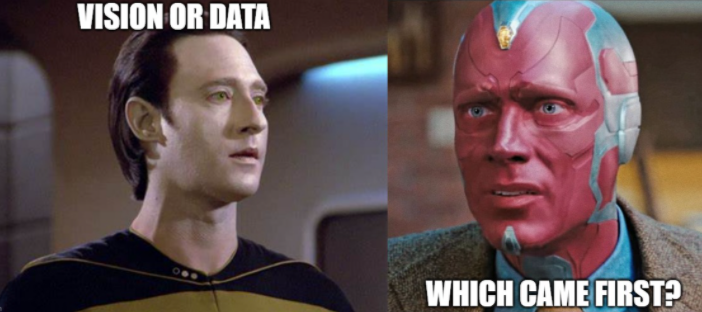Vision or Data: Which Came First? The Role of Business Intelligence.

The role of business intelligence in digital marketing is about how we form our views, and can we recognise if ideas are strategic in nature in the first place.
Successful companies invest in people who can solve the dilemma of Vision or Data: Which Came First?

Writing a blogpost to declare that an aspect of digital marketing is important, is up there with statements such as water is wet and the sky is blue. It’s easy to dismiss the value in the obvious.
“Yes”, you say, “we get it. Analytics is important. How is that pearl of wisdom going to help me get better at my job?”
To which I would reply, “Considering how many of you out there know just enough about using Google Analytics’ top level data to be dangerous, I think you should hear me out.” And out of curiosity if nothing else, you decide to give me a few more seconds of your time.
You see running any business, or running an ecommerce or digital marketing team, is about making decisions.
Those decisions are often laced with bias.

People often spend more time considering how a decision will reflect on them, than what to do if it’s a wrong decision. Marketers are especially keen to be seen as having A VISION, and will then look to find whatever data supports that vision.
Rarely do marketers look at the data first and then create their vision.
For fashion brands and lifestyle brands running Shopify stores, the need for instant KPI gratification means few take the time to map out an analytics roadmap for growth.
I’ve yet to meet an emerging brand on Shopify who doesn’t want growth, and yet planning for that growth very rarely involves a data-first approach to decision making.
If you’ve made 100 decisions on the fly already today, what’s one more? And there lies the problem. The challenge. The hypocrisy. Call it whatever you want.
We say the phrase data-driven the same way we know that diet and exercise are important to being healthy human beings, only to spend too much time eating snacks in a sedentary position binge-watching Netflix.
Humans are not data-driven. Only robots are data-driven.
The best we can do is become self-aware of our own limitations, and create a mechanism that sense checks our blind spots. Self-aware digital marketers? You’re more likely to start the next Silicon Valley backed unicorn!

So where does that leave us? We start by not dismissing the value in the obvious. Especially when what’s obvious to one person can make no sense to the rest of your organisation.
If you ever need a fresh perspective, look up at the stars in the night’s sky. Much like an ocean of stars, the data is always there and it does not care whether it receives any likes or thumbs up. Its value comes from what we do with that data, not whether it is popular or not. It doesn’t go away just because we wait for sunrise to change the lens by which we see things. We choose our lens every day through the stories we tell ourselves.
The role of business intelligence in digital marketing is about how we form our views, and our ability to recognise whether those ideas are strategic in nature in the first place.
In the marketing and advertising world, the question of ‘Vision or Data: Which Came First?’ is rarely posed let alone answered.
CMOs are often not around long enough at any given company to want to listen to any data that contradicts a pre-conceived vision. The challenge remains the same. Can we become more self-aware of how we form our views?
We must see the obstacles we face as decision makers if we are to use them to drive growth.
When recently asked to provide a quote on the importance of business analytics and its relevance to digital marketing today, here’s what I shared.
Successful companies will continue to invest in hiring talent so that it can think strategically for growth. It all starts with analytics. In business, every company wants increased growth and profitability. Knowing exactly what to focus on to achieve these outcomes, comes from data analysis. The quality of your data, the ability to interpret it, and then the ability to facilitate understanding across an organisation, these are the next-gen challenges for digital marketers. Analytics goes to the heart of the difference between tactics and strategy. If strategy is choosing the why and the what not to do, then it is underpinned by the data that informs that choice.
For junior digital marketers and startup brand marketers alike, becoming obsessed with business intelligence could increase your chances of long-term career success. I say could because for fashion brands the desirability and hype cycle driven by PR has arguably more impact on your immediate bottom line.
Look at how Amazon roadmap their success. They plan in multi-year cycles and when they have a great financial quarter, it was planned out years previously.
Your strategic choices decided by business intelligence are not going to present themselves overnight. They should evolve over time. Analytics, much like SEO, is better thought of as a daily fitness workout. Your awareness of the competitive landscape matters. Is there a bigger story behind what the data DOESN’T tell you than what it does? If price can’t be your USP, what are the attributes that matter most to your customers? What is going to distinguish your brand?
These are big questions.
For example if Amazon clone your product and create an ‘Amazon Basics’ version, they used data to make that decision. What data will you use as a marketer to return serve? If you’re Allbirds footwear you double down on brand. You run TV ads. You tell stories on social media. You create an emotional connection.
And you measure the impact of which stories and tactics resonated with the people who became new first-time customers.
Digitally native brands tend to avoid the following trap.
Fashion brands’ ecommerce teams left in a state of digital blackout, every time their main in-house analytics expert moves on, is an all too familiar story in my experience. Outsourcing that capability to agencies is a double edged sword. The biggest agencies will want to upsell you Google Analytics 360, or whatever Adobe are calling their software cloud this week. Sure, better software has benefits. However, there’s huge gains to be made simply by creating your own data warehouse and connecting all your APIs. A junior developer on an internship could likely build you this setup and feed your insights into Google Data Studio or Microsoft Power BI for a FRACTION of the big agency upgrade cost.
The next time someone pitches a big idea it’s worth asking the question. What came first: the Vision or the Data.
Which tees up a future article about the role of Data Visualisation in facilitating understanding across your organisation.

